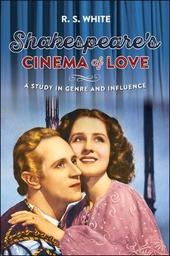
|
Shakespeare's Cinema of Love: A Study in Genre and Influence
Hardback
Main Details
| Title |
Shakespeare's Cinema of Love: A Study in Genre and Influence
|
| Authors and Contributors |
By (author) R. S. White
|
| Physical Properties |
| Format:Hardback | | Pages:256 | | Dimensions(mm): Height 234,Width 156 |
|
| Category/Genre | Film theory and criticism |
|---|
| ISBN/Barcode |
9780719099748
|
| Classifications | Dewey:791.43 |
|---|
| Audience | |
|---|
|
Publishing Details |
| Publisher |
Manchester University Press
|
| Imprint |
Manchester University Press
|
| Publication Date |
23 September 2016 |
| Publication Country |
United Kingdom
|
Description
This engaging and stimulating book argues that Shakespeare's plays significantly influenced movie genres in the twentieth century, particularly in films concerning love in the classic Hollywood period. Shakespeare's 'green world' has a close functional equivalent in 'tinseltown' and on 'the silver screen', as well as in hybrid genres in Bollywood cinema. Meanwhile, Romeo and Juliet continues to be an enduring source for romantic tragedy on screen. The nature of generic indebtedness has not gained recognition because it is elusive and not always easy to recognise. The book traces generic links between Shakespeare's comedies of love and screen genres such as romantic comedy, 'screwball' comedy and musicals, as well as clarifying the use of common conventions defining the genres, such as mistaken identity, 'errors', disguise and 'shrew-taming'. Speculative, challenging and entertaining, the book will appeal to those interested in Shakespeare, movies and the representation of love in narratives. -- .
Author Biography
R. S. White is Winthrop Professor of English at the University of Western Australia and Chief Investigator at the Australian Research Council Centre of Excellence for the History of Emotions 1100-1800 -- .
Reviews'R.S. White's timely book on the influence of Shakespeare on Hollywood cinema offers a refreshing account of the 'contestatory and symbiotic' relationship between Shakespeare's generic innovations and the development of cinematic genres in early Hollywood.' David McInnis, Australian Book Review June 2017 -- .
|